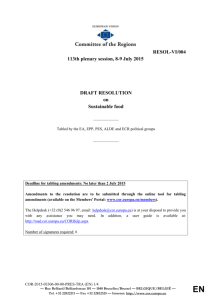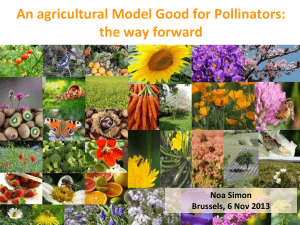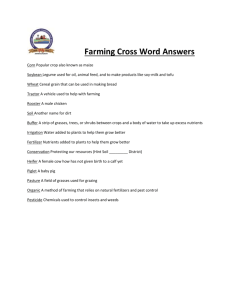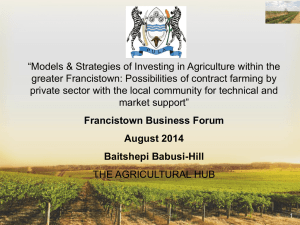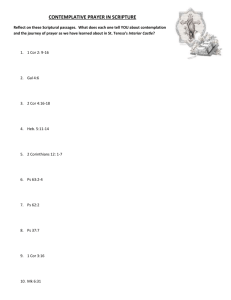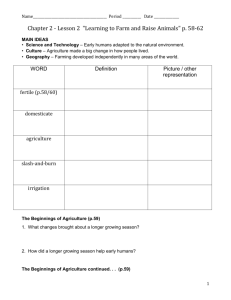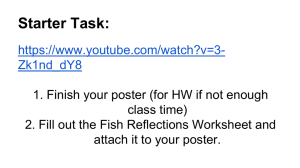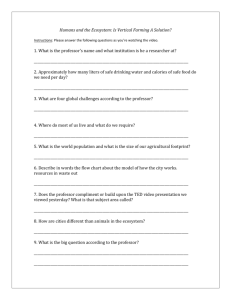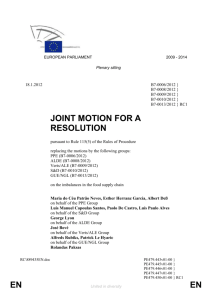Draft resolution on sustainable food
advertisement
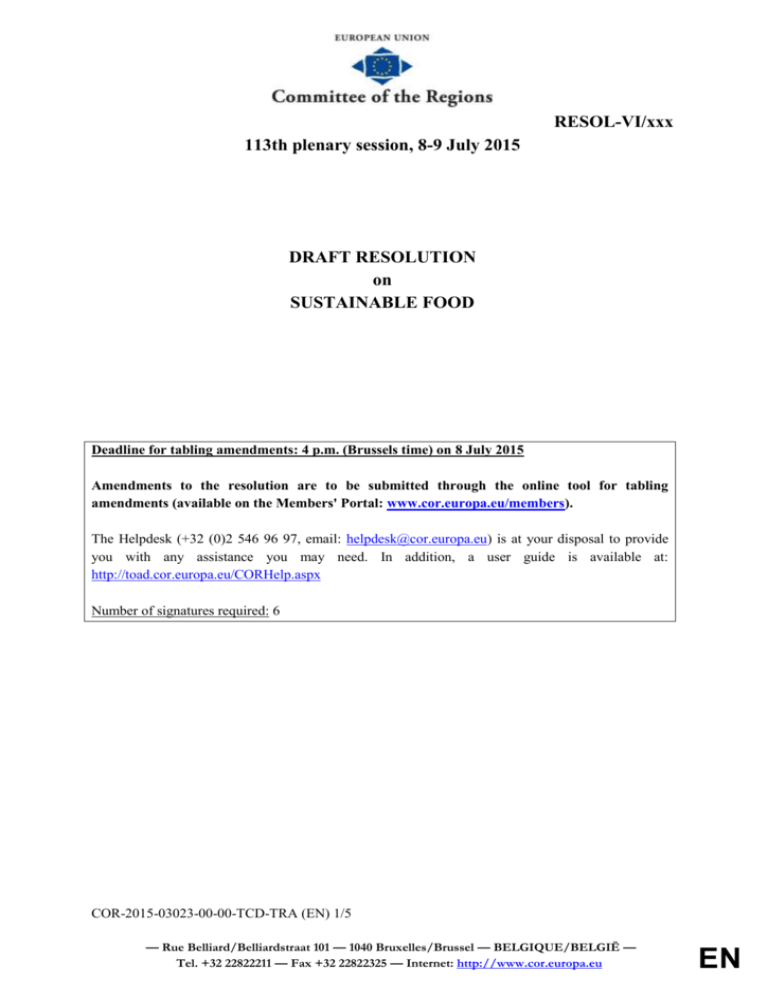
RESOL-VI/xxx 113th plenary session, 8-9 July 2015 DRAFT RESOLUTION on SUSTAINABLE FOOD Deadline for tabling amendments: 4 p.m. (Brussels time) on 8 July 2015 Amendments to the resolution are to be submitted through the online tool for tabling amendments (available on the Members' Portal: www.cor.europa.eu/members). The Helpdesk (+32 (0)2 546 96 97, email: helpdesk@cor.europa.eu) is at your disposal to provide you with any assistance you may need. In addition, a user guide is available at: http://toad.cor.europa.eu/CORHelp.aspx Number of signatures required: 6 COR-2015-03023-00-00-TCD-TRA (EN) 1/5 — Rue Belliard/Belliardstraat 101 — 1040 Bruxelles/Brussel — BELGIQUE/BELGIË — Tel. +32 22822211 — Fax +32 22822325 — Internet: http://www.cor.europa.eu EN The Committee of the Regions, having regard to the decision of the International Exhibitions Bureau to organise a universal exhibition in Milan from 1 May to 30 October 2015 on the theme "Feeding the Planet: Energy for Life"; having regard to the Communication from the Commission to the European Parliament, the Council, the European Economic and Social Committee and the Committee of the Regions of 3 May 2013 entitled "EU Participation at the World Expo 2015 in Milan 'Feeding the Planet: Energy for Life'" (COM(2013)0255); having regard to the Charter of Milan; having regard to the UN report "World Population Prospects: the 2012 Revision"; having regard to the FAO international Year of Soils 2015; having regard to Art. 25(1) of the UN Universal Declaration of Human Rights that recognises the right to food as a social, economic and cultural right; taking into account existing international treaties and the European convention on human rights; having regard to the UN Millennium Development Goals and the process leading to the future Sustainable Development Goals; taking into account the global strategic relevance of food security and healthy nutrition; having regard to Art. 45 of its Rules of Procedure; 1. notes that the world is currently facing a diverse and significant set of challenges: continued population growth and growth in spending capacity, triggering changes in diet and increased demand for primary products, combined with threats to global agricultural production capacity as a result of climate change; 2. notes that these challenges are accompanied by the threat of scarcity of food, feed, fossil fuels, commodities, fibres and fresh water, increasing soil degradation and biodiversity loss and an increasing risk of financial market failure, political imbalance and armed conflicts; 3. notes that agriculture and food supply must in future be more sparing in their use of water and fossil fuels, use less fertiliser and phytosanitary products, be more diversified and smarter in making the most of synergies between arable farming, livestock farming, organic waste management, residue streams and renewable energy production; COR-2015-03023-00-00-TCD-TRA (EN) 2/5 4. notes that farming is very important for the development of Europe's rural areas as it provides employment for almost 30 million people. These areas account for 90% of the Union's territory and are home to 60% of its citizens; 5. notes that farming ensures EU food supplies and helps to generate economic activity and jobs. It also provides valuable living environments, contributes to regional hydrogeological systems and preserves cultivated landscapes and tradition. Without farming, a multipurpose, sustainable development of Europe's rural areas is inconceivable; 6. points out that the Common Agricultural Policy (CAP) has been one of the European Economic Community's core areas of activity since its inception. The CAP has demonstrated how Community policies can deliver a high degree of added value for the society; 7. considers that in order to achieve the food security objective established by the Commission for the future Common Agricultural Policy it is vital to redress the balance of power within the food production chain in favour of producers; 8. underlines that organic and non-GMO food should form an important part of a sustainable diet; 9. considers that rural areas will be the most vulnerable to future changes in the climate scenarios created by climate change, which calls for the inclusion of mitigation measures and the adaptation of territorial planning, management and budgetary instruments so that participatory mechanisms and farming practices can be used to facilitate sustainable development; 10. in view of current lifestyle trends present in urban communities, proposes that these trends be used to promote the benefits of living in rural areas. Stresses that networking provides an unprecedented opportunity to forge close links between farmers and food consumers. Notes that these types of initiative can significantly contribute to the development of a new kind of rural-urban relations; 11. emphasises that short supply chains for agricultural products help to develop sustainable production and responsible consumption. They meet a growing demand from consumers for authentic, seasonal, locally and community-produced products. This is also a socially conscious model of consumption that is respectful of the environment, cuts down on packaging and food waste, limits CO2 emissions and supports sustainable production practices. Support for short supply chains should coexist with the promotion of cooperative integration as a factor that strengthens the market position of farmers. Supply concentration is an effective way to ensure fair prices for farmers and to secure the growing demand for food; COR-2015-03023-00-00-TCD-TRA (EN) 3/5 12. reiterates its request to the European Commission to promote reduction of food waste1 and to re-table a proposal for a food waste reduction objective of at least 30% by 2025, based on its withdrawn proposal from 2014 amending the Waste Framework Directive to promote a circular economy; 13. stresses, however, that producers who wish to engage in such initiatives face numerous problems. Ensuring a steady and regular supply of goods to consumers, who generally demand a continuous supply of food in sufficient quantity and variety, is often difficult. Costly equipment is generally required (e.g. specially adapted vehicles, cooling systems, sales points and processing facilities etc.). Recommends, therefore, that short supply chain activities should be supported; 14. advocates stepping up efforts to involve local and regional authorities on an increasingly systematic and practical basis in programmes aimed at the conservation and sustainable use of genetic resources in agriculture; 15. points out that society needs to be made aware of the value of genetic resources and the importance of conservation, research and sustainable use where these are concerned. At the same time, training programmes should be promoted for engineers and farmers, along with coordination, monitoring and assessment measures to safeguard biodiversity in the agricultural sector; 16. notes that effective monitoring of compliance with the rules of food and feed law and other rules on animal health and welfare, plant health, plant reproductive material and plant protection products serves to build a stable market which is based on public confidence in these products; 17. believes that the Common Fisheries Policy should contribute to long-term sustainable environmental, economic, and social conditions; 18. stresses that, in the European sphere, sustainable development has become the sine qua non of any socio-economic growth policy and that it has to be the focus for political commitment and resources in all sectors; 19. notes that the sustainable exploitation of biological resources must be based on the precautionary and eco-system approach with a view to limiting the impact of fishing activities on the environment and reducing and progressively eliminating unwanted catches; 20. calls on the European Union to promote the objectives of the Common Fisheries Policy internationally. To this end, the Union should strive to improve the performance of regional and international organisations in conservation and management of international fish stocks 1 CdR 140/2011 fin, http://portal.cor.europa.eu/europe2020/MonitoringFlagships/Pages/A-Resource-Efficient-Europe.aspx COR-2015-03023-00-00-TCD-TRA (EN) 4/5 by promoting decision-making based on science and improved compliance, increased transparency and stakeholder participation, especially fishermen, and by combating illegal, unreported and unregulated fishing activities; 21. stresses that aquaculture production must be treated as a strategic sector (on a par with other primary sector production areas) when it comes to responding to future challenges in the areas of food resources, natural resources and regional development; 22. notes that it has championed aquaculture in a number of its opinions, calling for this policy to be recognised in its own right, and properly funded and developed into a strong alternative to traditional fisheries; 23. takes the view that the EU should lead the way in the development of ecological and sustainable fish farming methods, pioneering the "blue revolution" by applying technology and innovation to fish production, feeding, hatching and harvesting within the EU. Brussels, July 2015. The President of the European Committee of the Regions Markku Markkula _____________ COR-2015-03023-00-00-TCD-TRA (EN) 5/5
